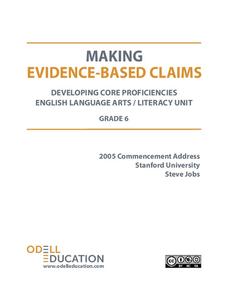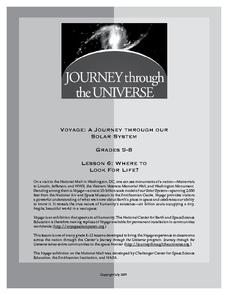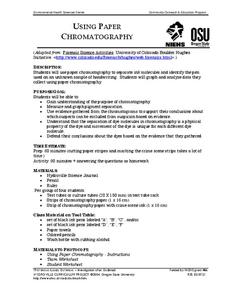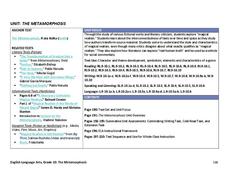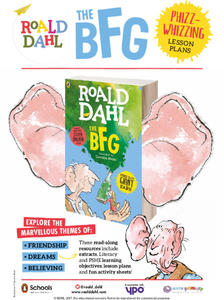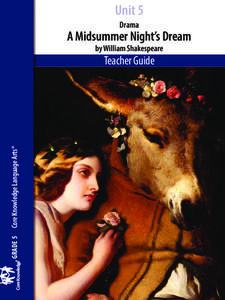Odell Education
Making Evidence-Based Claims: Grade 6
In order to make evidence-based claims, one must be able to draw explicit information from text. From here, learners take that information, analyze the text to develop a deeper understanding, and connect with the information in order to...
K12 Reader
If
Rudyard Kipling's advice to his son in the poem "If" is a resounding message that echoes through generations. After reading the famous poem, middle schoolers work on analyzing specific lines, completing activities based on...
Journey Through the Universe
Where to Look For Life?
Every year we discover new planets including more than 1,000 in 2016 alone. Will we ever find life on another planet? The activity includes two activities to help scholars understand this concept. First, they analyze the temperature...
University of Georgia
Endothermic and Exothermic Reactions
Equip your chemistry class with the tools to properly understand endothermic and exothermic reactions. Young chemists collect, analyze, and graph data to determine how the Law of Conservation of Matter is applied to chemical...
Oregon State
Using Paper Chromatography
Through the analysis of paper chromatography to separate ink from the pen found at the crime scene, learners analyze the different stains and through calculations determine the thief.
Facing History and Ourselves
Verifying Breaking News
The attempts of journalists to verify the events surrounding the shooting of Michael Brown take center stage as individuals analyze three of the initial newspaper accounts of the story. The whole class discussion then focuses...
Chicago Botanic Garden
Micro-GEEBITT Climate Activity
A truly hands-on and inquiry based learning activity bridges all the lessons in the series together. Beginning with a discussion on average global temperatures, young meteorologists use real-world data to analyze climate trends in order...
Curriculum Corner
Native American Literature
Celebrate and honor Native American culture with this set of graphic organizers that showcases literature like The Girl Who Loved Wild Horses and A Boy Called Slow as well as three other Native American literature books....
Louisiana Department of Education
The Metamorphosis
How can something be true even if it didn't happen? Invite your classes to investigate the truths found in the world of magical realism as they analyze short stories, poems, informational texts, video, and art from this genre.
Global Oneness Project
Far From Home
A timely and provocative lesson inspires high schoolers to tackle the Syrian refugee crisis. They analyze a compelling photo essay before discussing and writing about it.
Biology Corner
Pipe Cleaner Babies
Ever been told you have your father's eyes? How did it happen? Young biologists get a hands-on experience in meiotic gene expression with a fun pairs-based activity. Participants use pipe cleaner chromosomes with trait beads to make...
CK-12 Foundation
Rocks: Anatomy of Granite
Get earth science students excited about the formation of rocks with an engaging interactive resource. Learners analyze the composition of granite, then study the various processes that work together to make igneous, sedimentary, and...
University of Minnesota
Do the Stroop
The Stroop test helps diagnose executive function disorders when used in conjunction with other tests. Reading color words and identifying colors seem like basic skills, but the Stroop test may show otherwise. Scholars work with a...
Queen's Printer for Ontario
Evaluating Wartime Posters: Were They Good Propaganda?
"Back Him Up!" Scholars will analyze how World War I posters displayed, on the home front, often attempted to stir up emotions. As they examine the different ways people used propaganda posters during the war, they will create their own...
Center for Civic Education
The Power of Nonviolence: Rosa Parks: A Quest for Equal Protection Under the Law
Teach young historians about the historical legacy of Rosa Parks with a multi-faceted lesson plan. Pupils follow stations and use journals to explore prominent events, analyze primary resource documents, and engage in interesting...
Facing History and Ourselves
Life for German Youth in the 1930s: Education, Propaganda, Conformity, and Obedience
The German youth faced an onslaught of propaganda when they went to school, thanks to the Nazi regime led by Hitler during World War II. Pupils relate their education experiences to German youth by analyzing primary source readings,...
PBS
Malcolm X: Minister and Civil Rights Activist
Any study of the leaders of the Civil Rights Movement would be incomplete without an examination of the life of Malcolm X. Class members view a short biographical video and analyze primary source documents to gain an understanding of the...
PBS
Martin Luther King Jr.: Civil Rights Leader
Expand class members' appreciation of the work of Dr. Martin Luther King, Jr. A powerful resource examines King's speeches, writings, and actions that reveal his deep commitment to a nonviolent approach to Civil Rights. Learners watch a...
Echoes & Reflections
The "Final Solution"
Nazi policies shifted from deportation and imprisonment to extermination of the Jewish people in death camps in the "Final Solution." Learners examine photos of artifacts, read poetry written by survivors, analyze testimony from...
Facing History and Ourselves
Transcending Single Stories
The focus of the second lesson in the Standing Up for Democracy unit is on the power of assumptions based on a single experience or point of view. Class members begin by journaling about assumptions others make about their identity based...
College Board
Civic Knowledge and Action: Voter Registration
What does the data say? Using provided voter data from the 2016 presidential election, scholars describe the data and identify questions they could answer by analyzing it. Learners then construct tables and use them to determine whether...
Roald Dahl
Roald Dahl Matilda Lesson Plans
Fifty eye-catching pages contain six lessons about Roald Dahl's novel, Matilda. Each lesson has a theme and covers a different subject—literacy, social-emotional learning, science, and geography. Scholars analyze characters, examine...
Roald Dahl
The BFG Lesson Plans
A 55-page unit examines the novel, The BFG, by Roald Dahl. Six lessons pay close attention to friendship, dreams, and believing themes while analyzing interesting characters, writing creative vocabulary, smilies, metaphors, an exciting...
Core Knowledge Foundation
Unit 5: A Midsummer Night’s Dream
Fifth graders analyze William Shakespeare's A Midsummer Night's Dream, paying close attention to character development, plot, and dialogue. With daily reading and thoughtful discussion, scholars take pen to paper to respond to journal...
Other popular searches
- Analyze Portraits
- Analyze Characterization
- Analyze Maps and Charts
- Analyze Setting
- Analyze Writing Technique
- Analyze Character
- Analyze Poetry
- Analyze Letter to Editor
- Analyze Information
- Analyze Facts
- Analyze Author's Use of Text
- Analyze Plot Development
